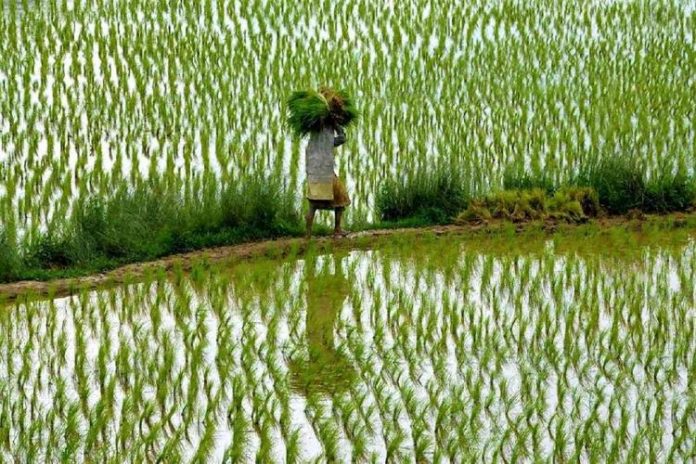
Crucial farm committee set to meet in Lucknow, but MSP, other issues still not solved

Some members of a government-formed committee looking into farmers’ issues are planning to submit their final report to the Centre soon, but many key problems still persist.
There is widespread concern that even if the committee submits its recommendations, others may not only refuse to accept them, but may even forcefully protest over them.
Some leaders say the vexed issues of procurement, crop diversification, and natural farming still loom large and need to be addressed.
“We’ll hand over our recommendations to Prime Minister Narendra Modi in June,” said committee member Guni Prakash. He is the leader of one of the factions of the Bharatiya Kisan Union (BKU).
Fellow member Pramod Choudhary of the RSS-affiliated Bharatiya Kisan Sangh (BKS) agree, but with riders. He said that procuring such huge amounts of commodities requires efficacious planning and seamless operation.
Lucknow meeting
Much of it depends on the five sub-committees, which will submit their report on various aspects in the next meeting scheduled in Lucknow on Friday (April 21).
Also read: We will make sure 2024 polls are fought on real issues: Farmers’ outfits
Other members are cautious in their responses. “We do intend to submit our recommendations in June. But it is not an easy task,” said Choudhary.
The committee, comprising farmers, representatives of Union and state governments, agricultural economists and others, was notified on July 18, 2022. It has been tasked with suggesting ways to make minimum support price (MSP) more effective and transparent, promote natural farming and change crop patterns keeping in mind the changing needs of the country.
The 26-member panel formed smaller groups with specific terms of reference.
Political issues
The Samyukta Kisan Morcha (SKM), who were offered three spots in the body, refused to nominate any representative. It was the SKM which led a year-long siege of New Delhi, demanding the repeal of the three farm laws enacted by the Centre. The siege was withdrawn after Parliament repealed the laws, and the government agreed to discuss their other demands, including changes in MSP.
Political issues still play a dominant role among union leaders. SKM leaders and those on the committee regularly took potshots at each other. The former had stayed away from the committee, claiming that the numbers were heavily loaded in favour of the government, and that they “cannot expect justice”.
Leaders like Guni Prakash, on the other hand, allege them of being politically aligned with the Opposition parties.
Also read: Maharashtra farmers call off long march to Mumbai
Debate over MSP
Meanwhile, current members of what is popularly referred as the ‘MSP committee’ continue to conduct their business.
“All aspects have to be scrutinised (before reaching a conclusion). All kinds of crops… the international aspect, among many others, need to be addressed,” Choudhary added, explaining the task ahead.
“Even within India, the cost of production varies. In some places, free electricity is provided to farmers, whereas in others, it is expensive. Such diverse aspects have to be incorporated since MSP has to be uniform across the country,” added the executive committee member of BKS.
Understandably, most aspects are related to MSP, where members are still silent on the issue of the government framing legislation ensuring it, or if they will recommend more commodities than the 23 included now.
The committee is also grappling with whether fruits and vegetables should be brought within the ambit of MSP. A member agreed, “We’ll have to see if there’s a consensus for increasing the number of produces in MSP.”
Also read: MSP panel: It’s hurried paperwork with little groundwork, say farmers
Crop diversification
Choudhary said that the committee is also facing issues with natural farming and crop diversification.
“Cultivators almost stop growing crops other than those being procured by the government. Thus, paddy and wheat remain the most popular crops,” he said, refusing to elaborate on “policy matters”.
However, he explained that oilseeds, for example, are still not being produced enough despite government thrust. Pulses also are being imported. Apart from fruits and vegetables, he considered onion, tomato, etc., “among important produce”, implying incentives or assistance to farmers to grow such commodities.
The sub-groups will have to deal with such issues and more, including recommended processes and terms of payment, assessment, valuation, etc.
Info on premium
There is not much official input regarding the meetings since the first one took place in Delhi on August 22 last year. Written queries to the information wing of the agriculture ministry elicited no response. Several questions raised by Members of Parliament regarding the number of meetings and the agenda have not been suitably answered, complain Opposition parties.
Also read: Will be forced to launch another protest if demands not met, says farmers’ outfit
“There have been about 15 meetings of the committee,” said Guni Prakash, adding, “and over 20 of the sub-groups.”
These groups also meet farmers, economists and academicians among others, and sift through policy documents to ascertain requirements.
Taking all such factors into consideration, the Lucknow meeting may help to zero in on the major issues. But, as far as a comprehensive recommendation is concerned, a few more deliberations may well be on the anvil.
Meanwhile, many farmers continue to wait for a clear policy and assistance.Some members of a government-formed committee looking into farmers’ issues are planning to submit their final report to the Centre soon.


